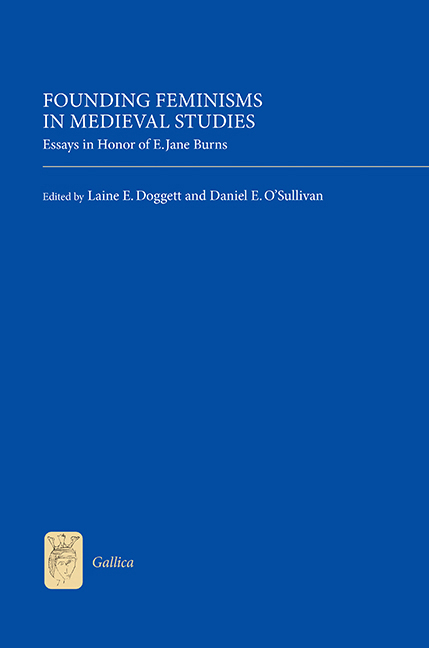Book contents
- Frontmatter
- Contents
- List of Illustrations
- List of Contributors
- Acknowledgements
- Introduction: The Work of E. Jane Burns and the Feminisms of Medieval Studies
- E. Jane Burns: A Bibliography
- Part I Debating Gender
- Part II Sartorial Bodies
- Hats and Veils: There's No Such Thing as Freedom of Choice, And It's a Good Thing Too
- When the Knight Undresses, his Clothing Speaks: Vestimentary Allegories in the Works of Baudouin de Condé (c. 1240–1280)
- John/Eleanor Rykener Revisited
- Part III Mapping Margins
- Part IV Female Authority: Networks and Influence
- Afterword: A Response to the Volume
- Index
- Tabula Gratulatoria
- Already Published
When the Knight Undresses, his Clothing Speaks: Vestimentary Allegories in the Works of Baudouin de Condé (c. 1240–1280)
from Part II - Sartorial Bodies
Published online by Cambridge University Press: 05 July 2016
- Frontmatter
- Contents
- List of Illustrations
- List of Contributors
- Acknowledgements
- Introduction: The Work of E. Jane Burns and the Feminisms of Medieval Studies
- E. Jane Burns: A Bibliography
- Part I Debating Gender
- Part II Sartorial Bodies
- Hats and Veils: There's No Such Thing as Freedom of Choice, And It's a Good Thing Too
- When the Knight Undresses, his Clothing Speaks: Vestimentary Allegories in the Works of Baudouin de Condé (c. 1240–1280)
- John/Eleanor Rykener Revisited
- Part III Mapping Margins
- Part IV Female Authority: Networks and Influence
- Afterword: A Response to the Volume
- Index
- Tabula Gratulatoria
- Already Published
Summary
To the thirteenth-century poet Baudouin de Condé are ascribed a number of didactic narrative poems that reflect on the decaying state of the social order using masculine military garments as object lessons. The extant manuscripts anthologize these poems among a number of Baudouin's poems in the bestiary tradition (on pelicans, elephants, and dragons, notably), so these garment meditations might be termed a kind of ‘vestiary.’ In ‘Du Gardecors,’ the poet compares a protective garment to a lord's loyal vassals who should protect him and his lands in difficult times. ‘Du Manteau d'Honneur’ allegorizes the knight's outer garment to extoll virtues that should adorn his moral character. ‘Des Hérauts’ is another manifestation of this author's didactic program directed at the subordinates of great lords and ladies. It contrasts the excessively fine dress of contemporary heralds with the humbler garb of times gone by when heralds wore knights' discarded cotes and boots, turning the noble cast-offs into rags through all weather, as better suited their station. Throughout his works Baudouin wages a campaign of words, ‘biaus mots,’ against unworthy courtly followers and villains, particularly the parasitic types who use words only to deprecate others. He also urges the powerful to listen to preudomes, worthy men of good conduct, rather than self-serving slanderers. This didactic program aimed at the subalterns who covet the robes that knights discard or give as loyalty gifts deserves to be scrutinized in the light of Jane Burns' recommendations to ‘read through’ clothing to find its deeper messages. These didactic and at times vituperative poems also provide some balance to Burn's studies of clerkly and misogynist criticism of women's clothing: Baudouin's gaze is fixed exclusively on men.
Baudouin's works have not received extensive critical attention, and when they have, the reception has often been ambivalent. In 1856 Paulin Paris condemned Baudouin for minimal originality, deriding his use of ‘strange rhymes’ and double meanings as irritating (‘pénible’). Baudouin's editor August Scheler assigned him to the ‘decadent’ period of French poetry, praising the corpus' utility for the history of the French language but summoning no more than faint praise for its ‘mediocre charm.’ However, Willy van Hoecke faulted Sheler's edition on many levels and with his own sought to demonstrate the poems' survival in a rich and complex manuscript tradition.
- Type
- Chapter
- Information
- Founding Feminisms in Medieval StudiesEssays in Honor of E. Jane Burns, pp. 97 - 110Publisher: Boydell & BrewerPrint publication year: 2016

